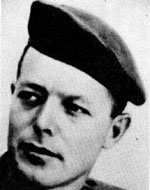Leshem, Reuben
Son of Avraham and Bella. He was born on June 19, 1932 in Afikim. After graduating from Deganya, he moved to the agricultural high school in Beit Yerah and took his matriculation exams as an examiner. Finally, he graduated from the Faculty of Political Science at Tel Aviv University. He was clear-minded and knew how to attack theoretical subjects that were far from his usual pursuits. He distinguished between important and very confident, and the thoroughness with which he analyzed problems before him, and the consistency with which he defended his conclusions made an impression on his university instructors as his mentor noted in the letter of condolence to the family after they had fallen. He did not stand out in his manner but as a standing leader he was out of sight and yet he aimed the life around him. The quiet, the sincerity, the inner security and his thought, accompanied by a laugh of indulgence – these were his qualities. He was drafted into the IDF in July 1951 and served in the Nahal Brigade as the commander of Nahla’im Alef, today’s Nahal Oz. He was then the commander of the Magal outpost. After his marriage he left the group and served in the paratroopers. He joined the regular army and reached the rank of major. In 1959 he was seriously injured but continued his active service in the permanent army. During the Six-Day War he was a member of the Command and Staff School, joined Raful’s division and took part in battles on the southern front where he was wounded and on the 16th of Sivan 5767 (June 16, 1967) he died of his wounds. Mordechai Gur, the commander of the Command and Staff School at the time, and his last direct commander, wrote a letter of condolence to his family after they fell, and writes about his familiarity with Reuven, who always knew him as a fearless fighter. In his first position, as commander of the outpost, as a young and inexperienced man, he had shown courage, thoughtfulness, resourcefulness and courage. “At the end of his remarks, he notes that both as an apprentice and as a senior officer, the people who worked with him enjoyed both his company and his work. The “group dialect” was dedicated to his memory, and was commemorated in “Kinrot”, a bi-monthly journal of the Emek Hayarden Regional Council, in which the Union of Kibbutzim and Kibbutzim, in memory of the members of the Union who fell in the battle, was commemorated and published. The Hebrew University of Jerusalem and the Student Union, edited by Yehuda Ha-Ezrachi, devoted several pages to his memory.
